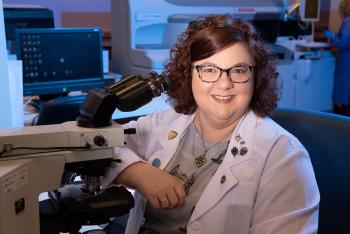Inspira Health is featured in a national colorectal cancer care report issued by Fight Colorectal...
Read More

Although it's the third most common cancer in the U.S., colorectal cancer rates have declined in recent years as preventive screening options become more advanced and widely available. Early stages of colorectal cancer don’t usually present symptoms, which is why regular screenings are the most important tools we have for preventing and detecting disease. When caught early, colorectal cancer is significantly easier to treat.
A colonoscopy is a screening test that allows your doctor to assess your colon and identify changes or abnormal growths. These include polyps, which typically begin as precancerous growths that are likely to transform into cancer over a period of years. Using a colonoscope—a thin, flexible tube equipped with a tiny video camera—doctors can see and even remove suspicious spots.
“During a colonoscopy, we can view the entire surface of the colon, perform a simple polypectomy and give patients one less cancer to worry about,” said Peter J. Senatore Jr., M.D., director of the Rectal Cancer Program at Inspira Health.
When you turn 45, your doctor will recommend screening for colorectal cancer. How often screenings should occur will depend on your personal health and risk factors. Most people in good health should schedule a colonoscopy once every 10 years, but some people may need to get screened every five years.
While colonoscopies are the most accurate and efficient screening tool, there are alternative non-invasive colorectal cancer screening options for those with average risk that can be done in the convenience of your home.
Two types of at-home tests look for blood in fecal samples: the guaiac-based fecal occult blood test (gFOBT) and the fecal immunochemical test (FIT). Both tests use a small fecal sample collected at home that is then sent to a lab.
Unfortunately, the gFOBT tests have an increased chance of false positive or false negative results, because blood in the stool isn’t always indicative of polyps or colorectal cancer. Blood can be indicative of hemorrhoids, an ulcer, or even a bitten lip. Additionally, certain medications and foods can sometimes trigger a false positive in the gFOBT test. Conversely, if polyps or cancer are present but not actively bleeding, the test can result in a false negative result. The FIT test is more accurate of the two tests as it is not affected by diet and medications. It has replaced the gFOBT in most situations. Both tests should be repeated annually.
A third type of at-home test is the stool DNA test known as Cologuard. This test looks for altered DNA in a patient’s stool and is the most accurate of the at-home screening options, falling in the 98th percentile for sensitivity. Stool DNA tests should be repeated every three years. It’s important to note that because they are more complicated and more expensive than the fecal blood tests, they may not be covered by all insurance carriers.
“Any screening is better than not getting screened at all. However, if you receive a positive result from an at-home test, you will be directed to undergo a diagnostic colonoscopy to look for polyps or tumors,” explained Dr. Senatore.
People with certain risk factors have a higher chance of developing colorectal cancer and should make early screening a priority. Your risk may be elevated if you:
Lifestyle habits, including what you eat and how physically active you are, play a role in your risk, too. By adopting a healthy lifestyle and making routine screenings a part of your wellness regimen, you can improve your chances of preventing colorectal cancer.
If you're lacking insurance, you may qualify for free colorectal cancer screening through the New Jersey Cancer Education and Early Detection (NJCEED) program.
Click to learn more about colorectal cancer.
Inspira Health is a high reliability organization (HRO), which means safety is the top priority for patients and staff. To make an appointment, call 1-800-INSPIRA.

Inspira Health is featured in a national colorectal cancer care report issued by Fight Colorectal...
Read More
For 81-year-old artist Bonnie Flanagan, an overall assessment of her health, which included a self...
Read More
Uncover the hidden connections between your family's past and your future well-being as we delve...
Read More
The material set forth in this site in no way seeks to diagnose or treat illness or to serve as a substitute for professional medical care. Please speak with your health care provider if you have a health concern or if you are considering adopting any exercise program or dietary guidelines. For permission to reprint any portion of this website or to be removed from a notification list, please contact us at (856) 537-6772